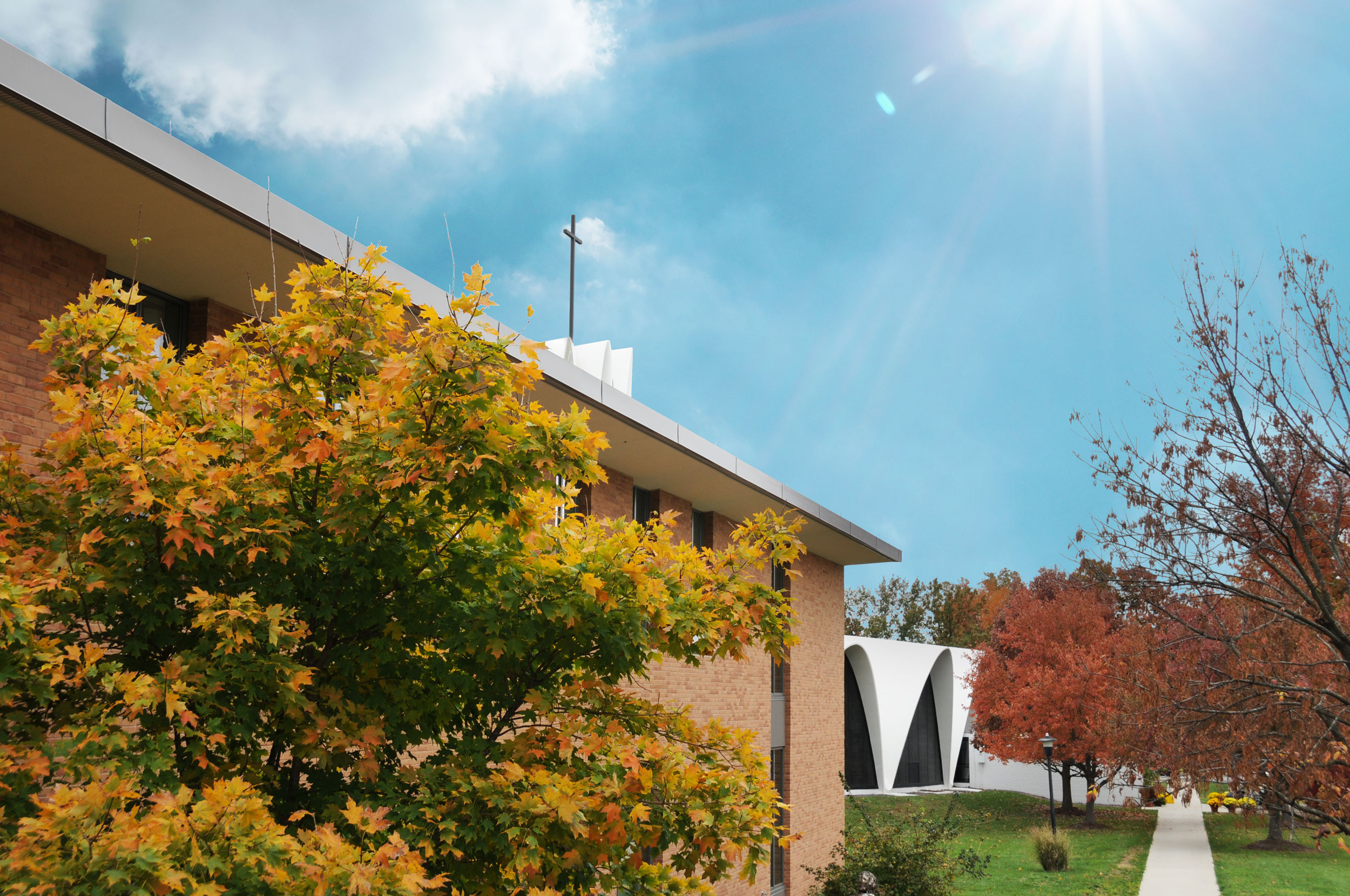
In his Rule, Saint Benedict asks of the novice, does he truly Seek God? This is the vocation of a monk. Does he seek God? The monk takes this pilgrimage of seeking God through the strong weapons of obedience and endures trials of the spiritual life with humility.
At Saint Louis Abbey we believe each of us relies on grace to discern God’s call. A personal prayer life and devotion are of course the best tools for deciding on and determining a monastic vocation. One must have an open heart and be willing to listen to the voice of the Lord in silence of his heart. After prayer and discernment, the natural step for those who feel the Lord may be calling them to the monastic life is to visit a monastery.
Please know of our prayers for you. We entrust you to the care of our blessed Mother and Saint Benedict.
If you have questions or would like to schedule a visit, contact our Vocations Director, Father Augustine. (fraugustine/at/priory.org)
If you would like to come for a visit, first email Father Augustine, and then fill out this brief form (https://forms.gle/ToNHNACniQ8gbhn66) (so we’ll know who to pray for.
“Today, if you shall hear his voice, harden not your hearts”

The Journey
* * *
Reading about monks, getting to know a monk, and even visiting a monastery are great ways to learn about the monastic life, but the best way to learn about it is to arrange with the Guest Master for a visit of a few days to live with us in our monastery.
As a guest you will join the community and experience our monastic way of prayer, the silence of the early hours, the give and take of community life. If you would like to get to know us better, you could visit for a week or even longer. Then if you find that you are drawn to the monastic life, pray about it, talk it over with your family, friends and confessor, then contact our Vocations Office for information about becoming a candidate, or postulant, for admission to the monastery.
The Postulancy
The purpose of the postulancy is for the candidate and community to get to know one another better. This happens during the day-to-day living, praying, working and recreating together as a monastic community. The postulant is assigned to a Postulant Master who is responsible for directing the postulant’s activities, job assignments and possible classes and is someone the postulant can always turn to for questions and for explanations. As a postulant, you begin to face the questions: “Can I really live under obedience?” “Can I live without my own cell phone and Facebook account?” “Can I live a life of chaste celibacy in a fraternity of monks?” If you are willing to explore these topics seriously and to even begin living the life of a monk, then you may be ready for the novitiate. The abbot and his council determine the length of the postulancy for each candidate and this may vary from person to person.
The Novitiate
The Novitiate, unlike the Postulancy, has an exact length: twelve months.
The Novitiate begins with a “clothing” ceremony when the new novice is clothed in the habit of our order and is given his monastic name by Father Abbot. He is then placed under the watchful care of the Novice Master who, like the Postulant Master, directs the details of daily life and who serves as his guide and “spiritual father.” The novice is initiated into the monastic spiritual tradition especially the Rule of Saint Benedict, those works recommended by Saint Benedict and the works of the fathers of the church. The theory and practice of the evangelical counsels are discussed and various books and papal documents such as Vita consecrata, are studied. Meditation, scripture study and the practice of lectio divina occupy an important place in the interior life of the novice. Sacristy work, kitchen dishes and yard work balance the contemplative part of the life with the active part of the life. There is also time to pursue interests in the arts and various hobbies. It is a very busy twelve months!
After a process of discernment, the novice now has his first opportunity to take vows as a Benedictine monk for a period of three years. If the novice wishes to continue living the monastic life and feels confident that he can embrace the vows and be faithful to them, he then requests profession. The abbot, his council and the community determine if the novice understands the obligations of the religious state and of the Rule, and can happily live the Conventual life. Then, if he passes the vote of the Chapter, he is given permission to profess vows for a period of three years.
The newly professed monk becomes a “Junior” monk but remains under the care of the Novice Master for one more year. The final two years of his Juniorate he is under the care of the Junior Master. During these years the junior begins an undergraduate or graduate study program in philosophy and/or theology. If he aspires to the priesthood, he may study at the local seminary. Solemnly professed monks may pursue studies domestically or abroad. Studies in other fields of learning are also considered depending upon the needs and interests of the individual and the community once a minimum of philosophy and theology coursework has been completed.
Solemn Vows
At the end of three years, the abbot, with the consent of the chapter, may admit the junior monk to solemn profession, that is, final vows. A junior may renew his simple vows for several more years if he and/or the abbot feel the need for further discernment. He may also decide against further profession and withdraw from the community.
The newly solemnly professed monk may move on toward ordination to the priesthood. He may instead, or in addition to the priesthood, pursue additional studies to prepare him for his professional life. Or he may be ready to take on responsibilities as discerned by the abbot and the school or parish administrations.
But whatever direction his “working life” takes, he is now a full member of the monastic community, living the full life of prayer and work (ora et labora) with the full chapter rights entitled to him by his solemn profession. The main point is that he has made a life-long commitment to the vowed life as a monk of this Abbey.
Continuing Formation
“At no stage of life can monks feel so secure and committed that they do not need to give careful attention to ensuring perseverance in faithfulness; just as there is no age at which a monk has completely achieved maturity.” (Vita consecrata, 69).
The monastic library, on-line courses, visiting speakers, continuing course work and the abbot’s chapters, together with his daily lectio divina are all resources for the monk to continue to grow in his life-long pursuit of seeking God.
“And if we fulfill the duties of tenants, we shall be heirs of the kingdom of heaven”

RECOMMENDED READING
GENERAL SPIRITUALITY
Introduction to a Devout Life, by St. Francis de Sales,
The Imitation of Christ, by Thomas à Kempis
MONASTIC SPIRITUALITY
The Rule, by Saint Benedict
Searching for God, by Basil Hume OSB
The Seven Storey Mountain, by Thomas Merton
The Genesee Diary: Report from a Trappist Monastery, by Henri J. M. Nouwen
The Wisdom of the Desert Fathers, by Sister Benedicta Ward
Sancta Sophia, by Augustine Baker
The Practice of the Presence of God, by Brother Lawrence,
BOOKS BY MONKS OF SAINT LOUIS ABBEY
Praying the Psalms in Christ, University of Notre Dame Press, by Fr Laurence Kriegshauser
The Grace of "Nothingness": Navigating the Spiritual Life with Blessed Columba Marmion, Angelico Press, by Fr Cassian Koenemann
In Good Soil: The Founding of Saint Louis Priory and School 1954-1973, Saint Louis Abbey Press, by Timothy Horner
RB 1980: The Rule of St. Benedict, Liturgical Press, by Timothy Horner
Humility Rules: Saint Benedict's Twelve-Step Guide to Genuine Self-Esteem, Igatius Press, by J. Augustine Wetta
Pray. Think. Act.: Make Better Decisions with the Desert Fathers, Igatius Press, by J. Augustine Wetta
The Eighth Arrow: Odysseus in the Underworld, A Novel, Igatius Press, by J. Augustine Wetta
Voices from the Upper Room, En Route Books and Media, by Dominic Lenk
Our Daily Bread: Glimpsing the Eucharist Through the Centuries, Paulist Press, by Ralph Wright
Via Crucis: Meditations on the Stations of the Cross, Paulist Press, by Ralph Wright OSB
God Woos: Favorite Poems of a Monk-Priest: 1970 – 2020, Mater Media, by Ralph Wright OSB
A Benedictine Education, Cluny Media, by Thomas Frerking O.S.B.

